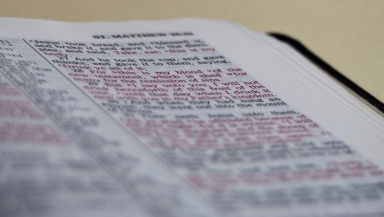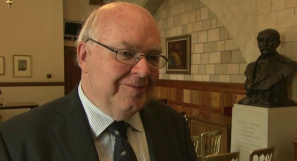"You can't argue people into the Kingdom"

Congratulations. You passed the first hurdle. Having seen the word 'apologetics' in the title, you still managed to read this far! To put it mildly, apologetics has a bad image. Indeed, such a bad image that at Solas we prefer to use the term 'persuasive evangelism' because apologetics either carries the notion of saying sorry for being a Christian, or of some male geeky nerd pontificating on the teleological argument. Like all caricatures there is some element of truth in this, but it is overall grossly unfair. It's time to rescue apologetics from this particular cul-de-sac and instead realise the usefulness of the apologia (defence) of the Gospel, in proclaiming the Good News in today's needy world. So lets look at some of the objections that stop Christians even considering apologetics in the first place.
1. Apologetics is just for nerdy geeks. There is an image problem. It appears as though unless one has a PhD from a top university, apologetics is best left alone. It is for the brain boxes, the people who like to think academically and who enjoy nothing more than to sit down with a glass of wine and a couple of books on Descartes and Derrida. While you have nothing against those who are so inclined (and gifted), you like to be more practical/spiritual/prayerful. But this is to create a false dichotomy. All of us are made in the image of God, and all of us therefore are Logos – we have minds and we are expected to use them. None of us are expected to believe without some evidence. God addresses the heart through the mind, not vice versa.
My simple way of putting this is: if you cannot answer the questions of a 12-year-old, you won't be able to answer anyone's questions; but if you can, then you can answer anyone's! The hardest questions I have ever been asked haven't come from journalists at The Times or the keyboard warriors of the New Fundamentalist Atheists, but rather from the young thinking teenager whose questions are for real. Not to think about them is to disrespect and despise them. Apologetics is for all!
2. Apologetics is too negative. It's not so much that people think apologetics is about apologising for Christianity (I'm sorry for the Crusades, the Inquisition, Westboro Baptist and Ned Flanders, as though I were responsible for them all!), but rather that, in either of its main forms, it is considered negative. On the one hand being 'defensive' comes across as though we perceive ourselves as constantly under attack; on the other if we go on the offence, we are perceived as being offensive. It's a lose/lose situation. Sometimes, however, we need to remember that we live in the real world, where stating a 'negative' can be a good thing. "Don't drink that liquid because it's poison" may be a negative statement, but it's kind of a crucial one! But the apologia of the Good News is not about defending something which needs our help, it's about proclaiming it in a world which desperately needs it, while not understanding that desperate need.
CH Spurgeon once quipped, "Defend the Bible? I would as soon defend a lion!" Apologetics is not about defending God, or apologising for him – it's about letting the lion loose. It's proclamation!
3. Apologetics is not spiritual – it's man centred, and not biblical. This is something I hear from all quarters. "Do you think you can persuade people? Does God need your arguments? All you need is love. Just be nice to people. Let them come to church and hear our praise. Let us go to them and show them how nice we are, and they will want to become like us!" Or the big one – "it's the work of the Holy Spirit". Who is going to disagree with that latter statement? But do these same people then say that preaching, prayer, mercy ministries, and social action are all useless? No? Why not? Are they too not the work of the Holy Spirit? The fact is that the Holy Spirit uses means – and that includes apologetics. Most people are not struck down on the road to Damascus, the train to Derby or the plane to Denver. They come to an appreciation of the truth through a variety of experiences. Defending and explaining the Gospel, (apologetics) is just simply one tool that the Spirit uses. How dare we say that we don't need it?!
4. Apologetics is not evangelism – it's for the Church. This is an interesting one, because the way that apologetics is often done makes it seem as though it is for the Church. Many of the responses to Richard Dawkins' The God Delusion appear not to attempt to reach out to the many non-Christians who are now thinking about God, the Bible and the Church, but rather to assure the author's own tribe that their man was on the ball, and that they did not need to worry about the ravings of this godless heathen. Right now, apologetics in the US is perceived as something particularly necessary to protect the young of the church from the ever-increasing atheistic secularism.
While I think it is good to give Christians 'reasons to believe', it is not the primary purpose of apologetics. If people are already Christians and know Christ, why would they need reasons? Is Christ not the greatest reason? What they do need is a greater knowledge of Christ and his Word, and an understanding of the contemporary world and the many lies that the devil tells people, so that they can 'always be prepared to give an answer to everyone who asks you to give the reason for the hope that you have' (1 Peter 3:15). Evangelism without apologetics is like fish and chips without the fish – the substance is missing!
5. Apologetics doesn't work. In the all-pervasive, quick fix culture in which we live, it appears as though apologetics doesn't work. At least that is what I am constantly told. You don't hold an alter call at the end of an apologetics talk. Communicating the good news is like sowing the good seed, you first plough the ground, then sow the seed and eventually (after God gives the increase) you reap the fruit. The trouble is that most evangelism as currently practised seems to be about the latter. I have found that patiently working away, dealing with the defeater beliefs, challenging the misconceptions and prejudices, and telling people about Jesus is like a constant dripping. It eventually brings fruit. We may not get the glory, but then we should not want it. The glory is Christ's, whatever our particular function. Without apologetics, evangelism does not work.
A defeater belief is something that someone has which prevents them even considering the good news of Jesus Christ. These come in various forms, 'science has disproved religion', 'religion is the cause of all evil', 'there are too many gods to choose from' etc. Over the next few weeks I am going to be writing on the basic 'defeater' beliefs that people have.
Each week I will also recommend a book that will be helpful for you if you wish to develop this further. We begin with the absolutely magnificent Fool's Talk by Os Guinness. This is the best apologia for apologetics, and the best example of how to do it, that I have ever read. When I grow up I want to be like Os! The Bible, in an unerring prophecy of the forthcoming desktop publishing, tells us that 'of making many books there is no end and much study wearies the body' (Ecclesiastes 12:12). With thousands of Christian books published every year we need to be discerning. Fool's Talk is a diamond in the rough – and well worth 'wearying the body' in order to study!
From Os' book I leave you with a wonderful prayer he cites from the late, great John Stott: "I pray earnestly that God will raise up today a new generation of Christian apologists or Christian communicators, who will combine an absolute loyalty to the biblical Gospel and an unwavering confidence in the power of the Spirit with a deep and sensitive understanding of the contemporary alternatives to the Gospel." And all God's people said – Amen!
David Robertson is the moderator of the Free Church of Scotland and director of Solas CPC, Dundee.


















